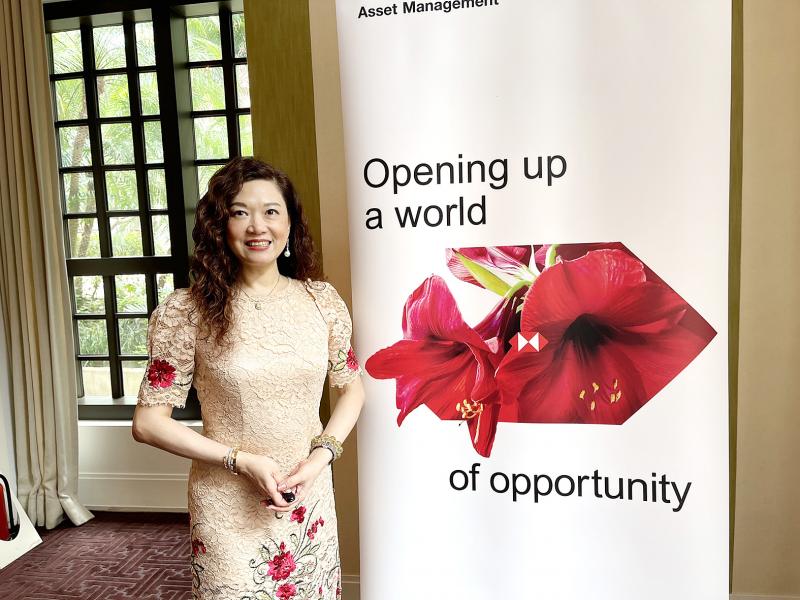HSBC Global Asset Management Taiwan Ltd (匯豐中華投信) is to grow local operations by expanding its management team and launching new funds by the end of this year, chief executive officer Chiao Hsin (焦訢) told a news conference in Taipei yesterday.
The asset management company has about 80 employees, and it would add five senior managers who would be in charge of portfolios and projects, Chiao said.
“The positions would be offered to local talent. We are already interviewing some candidates. It is possible that the positions would be filled in the third quarter,” Chiao said.

Photo: CNA
While it is uncommon for local asset management companies to expand their senior management teams, HSBC Global Asset Taiwan has been committed to deepening its local operations, she said.
The company would also ask for more resources from its parent company to enhance staff training, investment research, risk controls and product design to boost business in the local fund market, Chiao said.
“We have discussed with our overseas investment team the design of a new onshore fund that we plan to launch by the end of this year. We can bring a global perspective in fund design, as HSBC is an international group,” Chiao said.
The company would factor in rate hikes and inflation when it chooses investment targets, as both are expected to persist over the next few years, Chiao said.
The new fund would also have environmental, social and corporate governance (ESG) factors, and would comply with tighter rules that were announced by regulators in January, Chiao said.
While regulators have not specified the types of companies in which ESG-themed funds must not invest, HSBC Global Asset Taiwan would not invest in companies that make tobacco products or alcoholic beverages, or run gambling operations, she said.
“Besides those companies, we will not specifically select industries, as a company in an energy-consuming field could still perform well in ESG,” Chiao said.
MORE RESISTANT
ESG funds are more resistant to risks than other types of funds, as the companies that are chosen by such funds usually have two properties — great scale of operations and good cash flow, Chiao said.
The company has introduced 23 offshore funds to local investors, all of which meet the European Supervisory Authorities’ Sustainable Finance Disclosure Regulations, Chiao said.
Eight of the funds conform with Article 8 of the regulations, as the companies they invest follow good governance practices and can be called “light green funds,” she said.

Sweeping policy changes under US Secretary of Health and Human Services Robert F. Kennedy Jr are having a chilling effect on vaccine makers as anti-vaccine rhetoric has turned into concrete changes in inoculation schedules and recommendations, investors and executives said. The administration of US President Donald Trump has in the past year upended vaccine recommendations, with the country last month ending its longstanding guidance that all children receive inoculations against flu, hepatitis A and other diseases. The unprecedented changes have led to diminished vaccine usage, hurt the investment case for some biotechs, and created a drag that would likely dent revenues and

Global semiconductor stocks advanced yesterday, as comments by Nvidia Corp chief executive officer Jensen Huang (黃仁勳) at Davos, Switzerland, helped reinforce investor enthusiasm for artificial intelligence (AI). Samsung Electronics Co gained as much as 5 percent to an all-time high, helping drive South Korea’s benchmark KOSPI above 5,000 for the first time. That came after the Philadelphia Semiconductor Index rose more than 3 percent to a fresh record on Wednesday, with a boost from Nvidia. The gains came amid broad risk-on trade after US President Donald Trump withdrew his threat of tariffs on some European nations over backing for Greenland. Huang further

CULPRITS: Factors that affected the slip included falling global crude oil prices, wait-and-see consumer attitudes due to US tariffs and a different Lunar New Year holiday schedule Taiwan’s retail sales ended a nine-year growth streak last year, slipping 0.2 percent from a year earlier as uncertainty over US tariff policies affected demand for durable goods, data released on Friday by the Ministry of Economic Affairs showed. Last year’s retail sales totaled NT$4.84 trillion (US$153.27 billion), down about NT$9.5 billion, or 0.2 percent, from 2024. Despite the decline, the figure was still the second-highest annual sales total on record. Ministry statistics department deputy head Chen Yu-fang (陳玉芳) said sales of cars, motorcycles and related products, which accounted for 17.4 percent of total retail rales last year, fell NT$68.1 billion, or

MediaTek Inc (聯發科) shares yesterday notched their best two-day rally on record, as investors flock to the Taiwanese chip designer on excitement over its tie-up with Google. The Taipei-listed stock jumped 8.59 percent, capping a two-session surge of 19 percent and closing at a fresh all-time high of NT$1,770. That extended a two-month rally on growing awareness of MediaTek’s work on Google’s tensor processing units (TPUs), which are chips used in artificial intelligence (AI) applications. It also highlights how fund managers faced with single-stock limits on their holding of market titan Taiwan Semiconductor Manufacturing Co (TSMC, 台積電) are diversifying into other AI-related firms.